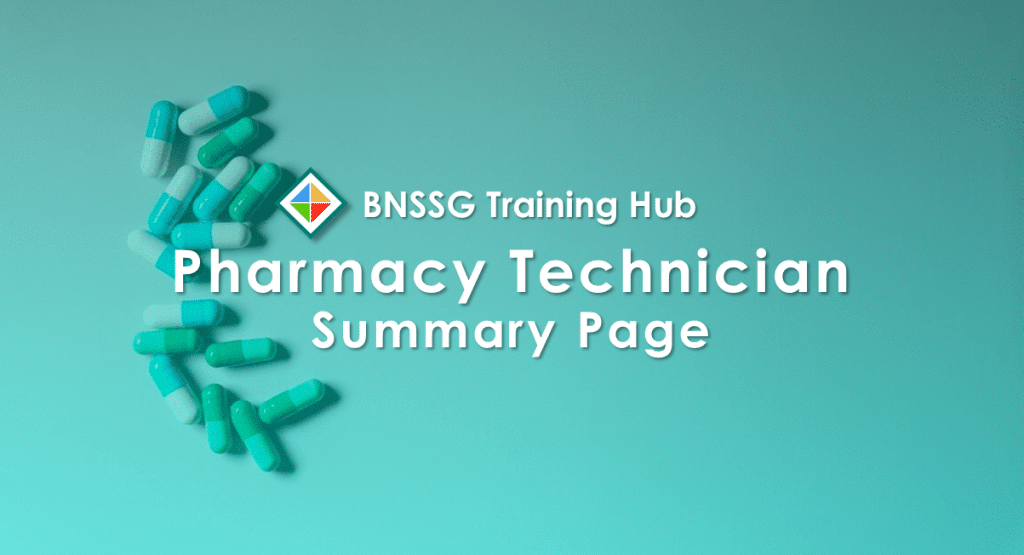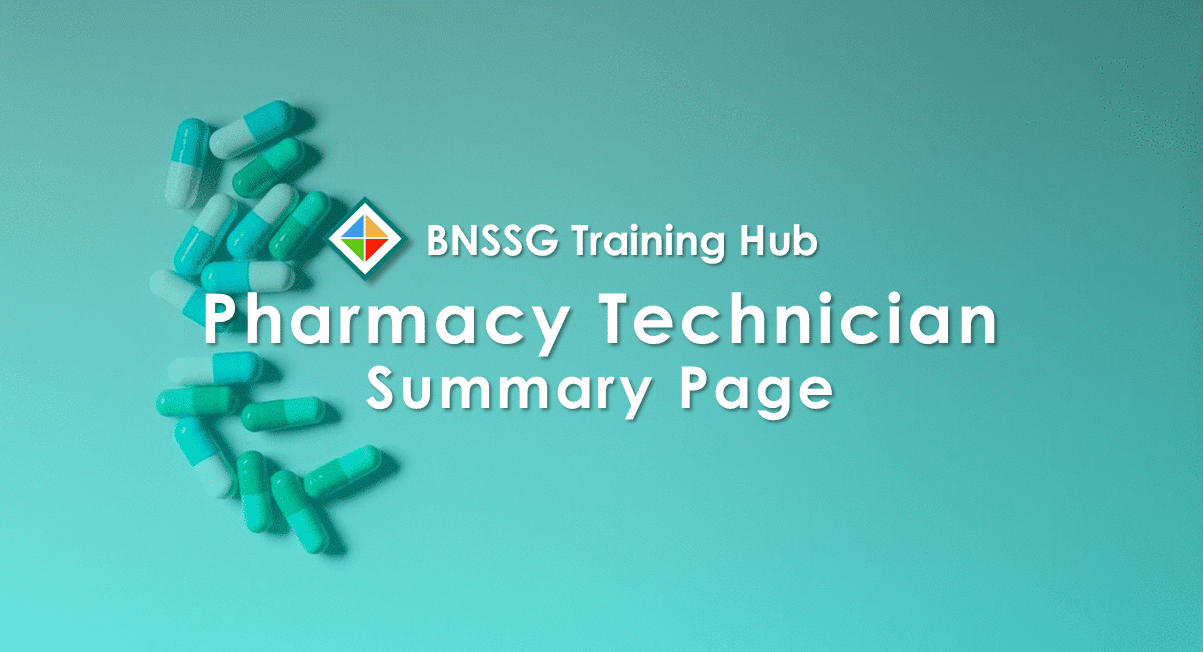What are they?
What benefits can they bring?
What is their scope of practice?
Is funding available for them?
Any case studies?
What characteristics, training / qualifications, and competencies should they have?
Are there any requirements to receive ARRS funding?
What employment routes are there?
Any job descriptions?
Any sample interview questions?
What clinical supervision do they need?
What ongoing support is available?
What are they?
Pharmacy technicians are an emerging profession in general practice and play a valuable role within the primary care multi-disciplinary team (MDT), supporting their fellow healthcare professionals in focusing on clinical care. The role complements clinical pharmacists, with pharmacy technicians typically working under the direction of clinical pharmacists in a practice pharmacy team.
Pharmacy technicians can complete a variety of tasks through use of their acquired pharmaceutical knowledge, help with a range of tasks that vary in complexity from preparing the repeat prescriptions to undertaking prescribing audits and helping patients get the best outcomes from taking their medicines providing consultations to ensure patients use their medicines appropriately, and conducting audits.
HEE's Pharmacy Technician Role Overview
Provided by HEE, this page offers a succinct look at the education and training requirements, skills and competencies, and work activities of pharmacy technicians.
To read it, please click here.
What benefits can they bring?
There are several benefits to appointing a pharmacy technician to your team. As long-established healthcare professionals, they are well-equipped to deal with a wide range of tasks (managing prescription queries and repeat requests, as examples), allowing clinical pharmacists and GPs to spend their time addressing more complex cases.
Dorset Training Hub has produced a two-page document exploring what pharmacy technicians can bring to primary care MDTs, as linked below:
What Can Pharmacy Technicians Contribute to the GP Team?
Produced by Dorset Training Hub, this two-page document highlights the benefits arising from having pharmacy technicians in primary care MDTs.
To read it, please click here.
Greater Manchester Training Hub, Greater Manchester Health and Social Care, NSHEI, and HEE have also produced a video which partly explores the benefits provided by pharmacy technicians.
For more:
ARRS Webinar 4 - Pharmacy Techs & Physician Associates
Provided by Greater Manchester Training Hub, HEE, NHSEI, and Greater Manchester Health and Social Care, this webinar partly covers the role and work of pharmacy technicians.
[This was published on 07.04.21]
To watch it, please click here.
What is their scope of practice?
The scope of practice of a pharmacy technician includes, but is not exhaustively limited to, the following tasks:
- Act in patient-facing and patient-supporting roles, facilitating shared decision making conversations, to see to it that medicines are used effectively
- Carry out clinical duties
- Champion antimicrobial stewardship in order to reduce inappropriate antibiotic prescribing
- Collaborate with clinical pharmacists on the clinical aspects of shared care protocols and treatments for more complex patients
- Complete medication reviews
- Deliver audits
- Helping PCNs to ensure efficient medicine optimisation processes are in place, in addition to meds reviews for patients
- Respond to medicines information queries
- Support the implementation of personalised care
- Where appropriate, offer specialist expertise to fellow MDT staff, patients, and the general public (this can include lifestyle advice, service information, and guidance on local health inequalities)
For more information on the scope of practice of this profession, please consult HEE’s Pharmacy Technician Role Overview and the Dorset Training Hub’s page on pharmacy technicians.
HEE's Pharmacy Technician Role Overview
Provided by HEE, this page offers a succinct look at the education and training requirements, skills and competencies, and work activities of pharmacy technicians.
To read it, please click here.
Dorset Training Hub's Pharmacy Technician Page
Kindly provided by Dorset Training Hub, this page signposts to several useful documents including the role of Pharmacy Technicians
To read it, please click here.
Is funding available for them?
HEE stipulates that from April 2020, pharmacy technicians will be reimbursed via the Additional Roles Reimbursement Scheme (ARRS) at 100% of actual salary plus defined on costs. This is up the maximum reimbursable amount of £35,389 over 12 months.
Source:
HEE's Pharmacy Technician Role Overview
Provided by HEE, this page offers a succinct look at the education and training requirements, skills and competencies, and work activities of pharmacy technicians.
To read it, please click here.
What characteristics, training / qualifications, and competencies should they have?
Please find information on what you should look out for when employing a pharmacy technician below:
Personal Characteristics
Pharmacy technicians should have personal characteristics that are in keeping with the Standards for pharmacy professionals provided by the General Pharmaceutical Council, with the most recent standards being published in May 2017. They outline what is expected from pharmacy professionals, and serve as a reflection of how pharmacy professionals view themselves and their colleagues.
In short, Pharmacy Technicians should adhere to these nine standards:
- Provide person-centred care
- Work in partnership with others
- Communicate effectively
- Maintain, develop and use their professional knowledge and skills
- Use professional judgement
- Behave in a professional manner
- Respect and maintain patient confidentiality and privacy
- Speak up when they have concerns or when things go wrong
- Demonstrate leadership
To read the Standards themselves, which include a breakdown, please click here.
Training and Qualifications
There are a range of education, training, and experience requirements that pharmacy technicians must meet in order to practise in their profession. For starters, they must be registered with the General Pharmaceutical Council (GPhC) — to register with the GPhC, they must meet a number of criteria, including completion of both a knowledge qualification / course and a competence qualification. This can be achieved through GPhC-accredited courses, GPhC-recognised qualifications, or a GPhC-approved apprenticeship pathway.
The GPhC has provided, as of January 2021, a comprehensive ten-page breakdown of the requirements for registering as a pharmacy technician. It outlines what pharmacy technicians need to do to register in the first instance and if they are returning to work following a period of absence.
To access it, please click here.
For a list of all accredited courses and qualifications, please click here.
To be employed in primary care and receive funding from the Additional Roles Reimbursement Scheme (ARRS), there are additional criteria that pharmacy technicians must meet.
For a breakdown of these, please click here.
Competencies
Pharmacy Technicians should have experience with the following competencies:
- Providing safe and effective pharmacy services
- Supply medicines and devices to patients, whether on prescription or over the counter
- Achieving the best outcomes through a patient’s medicines
- Assemble medicines for prescription
- Provide information to patients and other healthcare professionals
- Manage areas of medicine supply such as dispensaries
- Supervise other pharmacy staff/training and development
- Answering patients’ questions face to face or by phone
- Pre-packing, assembling, and labelling medicines
- Referring problems or queries to the pharmacist
- Quality control
- Procurement
- Information technology
- Clinical trials
- Medicines information
This list has been sourced from HEE’s Pharmacy Technician Role Overview. To see the original, please click here.
Are there any requirements to receive funding?
As noted under ‘Is funding available for them?‘, Pharmacy Technicians can be reimbursed via the Additional Roles Reimbursement Scheme (ARRS). However, to be eligible for this funding, there are requirements that clinical pharmacists must adhere to.
For instance, as stated in Annex B of the Clinical Pharmacist Direct Enhanced Service (DES) contract:
- “B2.1. Where a PCN employs or engages a Pharmacy Technician under the
Additional Roles Reimbursement Scheme, the PCN must ensure that the Pharmacy Technician:- a. is registered with the General Pharmaceutical Council (GPhC);
- b. meets the specific qualification and training requirements as specified by the GPhC criteria to register as a Pharmacy Technician;
- c. be enrolled in, undertaking or qualified from, an approved training pathway. For example, the Primary Care Pharmacy Educational Pathway (PCPEP) or Medicines Optimisation in Care Homes (MOCH);
- and d. is working under appropriate clinical supervision to ensure safe, effective and efficient use of medicines in order to deliver the key responsibilities outlined in section B2.2.”
Section B1.2. relates to the key responsibilities that clinical pharmacists must undertake.
To read the full annex, please consult ARRS Minimum Role Requirements below.
ARRS Minimum Role Requirements
This document, Network Contract DES, clarifies the minimum requirements for Pharmacy Technicians receiving funding through the ARRS. Please refer to page 16 onwards.
To read it, please click here.
Any case studies?
Health Education England (HEE) East Midlands is able to provide several short case studies, showcasing the different roles undertaken by pharmacy technicians in improving clinical care and efficiency in a variety of settings, and highlighting the possibilities this profession has to offer.
What employment routes are there for pharmacy technicians?
According to the General Pharmaceutical Council (GPhC), there are two routes to registration for pharmacy technicians intending to work in Great Britain. As laid out in their Criteria for registration document, the routes are:
- Initial registration by UK- and internationally-qualified pharmacy technicians
- Returning to registration after a period of absence
Both routes are detailed in the Criteria document, linked below. In addition to education and training checks, the registration routes also look at candidates’ health, character, identity, and grasp of the English language.
For more information:
GPhC Criteria for registration
Produced by the General Pharmaceutical Council (GPhC), this ten-page document covers the requirements for pharmacy technicians wishing to practise in Great Britain (which requires registering with them). Last published in January 2021.
To access it, please click here.
Please note: to be employed in primary care and receive funding from the Additional Roles Reimbursement Scheme (ARRS), there are additional criteria that pharmacy technicians must meet.
For a breakdown of these additional requirements:
ARRS Minimum Role Requirements
This appendix, from the Pharmacy Technician Contract DES, clarifies the minimum requirements for Pharmacy Technicians receiving funding through the ARRS.
To read it, please refer to pages 70/71 click here.
What ongoing support is available for pharmacy technicians?
There are various ways in which pharmacy technicians can receive support, including:
The ACP Forum
Organised and led by our ACP Lead, Kerri Magnus, The ACP Forum can assist clinical pharmacists on the journey to becoming an advanced clinical practitioner. The Forum can signpost to relevant education and training, provide 1-to-1 guidance, and facilitate networking with like-minded colleagues from across BNSSG.
To visit The ACP Forum’s site, please click here.
The Hub's Physiotherapy Lead
We hope to soon be welcoming a new member to our team: a Physiotherapy Lead. They will provide a point of contact for clinical pharmacists, helping you to set objectives and career goals, and to keep in the loop with our pharmacy-related work.
Please stand by for more.
CPPE Pharmacy Technician Newsletter
This is a quarterly email newsletter, intended to keep you up to date with events at the Centre for Pharmacy Postgraduate Education (CPPE). To receive it, please register on the CPPE site or update your profile.
To head over to the CPPE site, please click here.
Any sample interview questions?
The Primary Care Pharmacy Association (PCPA) kindly provides sample interview questions for pharmacy technicians on their website, accessible via the button below. The sample interview questions themselves are at the bottom of the page.
Any job descriptions?
NSHEI have developed a job description, in addition to a recruitment pack — these are both available on the FutureNHS site. Accessing the site requires you to create an account; once done, you can visit the role selection page to find the resources in question (click here to jump to the role selection page — remember, you will need to be logged in to access it).
The Primary Care Pharmacy Association (PCPA) have also kindly provided several example job descriptions, for various bands of working, on their site, accessible via the button below.
What clinical supervision do they need?
When employed in primary care under the Additional Roles Reimbursement Scheme (ARRS), pharmacy technicians must receive an appropriate level of clinical supervision. The Centre for Pharmacy Postgraduate Education (CPPE) clarifies that this involves supervision from a pharmacist experienced in the same area of practice.
GPs are able to serve this function, too, but they are expected to liaise with a senior pharmacist to better understand the scope of practice of pharmacy technicians, and how best to help them develop.
The CPPE also offers training to become a clinical supervisor for individuals supervising pharmacy professionals on the CPPE Primary Care Pharmacy Education Pathway. This is a half-day workshop generally, but it can be completed by attending two webinars.
Interested individuals can apply for a space via the CPPE website, here. If you are not a pharmacy professional, you will need to create an account on the site before you are able to book a place.
For more information on CPPE’s offer, and the requirements for pharmacy clinical supervision, please peruse the Primary care pharmacy education pathway booklet below.
Primary Care Pharmacy Education Pathway
Produced by the Centre for Pharmacy Postgraduate Education (CPPE), this thirty-eight-page document covers the work of pharmacy clinical supervisors. Last published in June 2021.
To access it, please click here.
Literature
ARRS Minimum Role Requirements
This appendix, from the Clinical Pharmacist DES Contract, clarifies the minimum requirements for clinical pharmacists receiving funding through the ARRS.
To read it, please click here.
Dorset Training Hub's Pharmacy Technician Page
Kindly provided by Dorset Training Hub, this page signposts to several useful documents exploring the role of clinical pharmacists.
To read it, please click here.
GPhC Criteria for registration
Produced by the General Pharmaceutical Council (GPhC), this ten-page document covers the requirements for pharmacy technicians wishing to practise in Great Britain (which requires registering with them). Last published in January 2021.
To access it, please click here.
HEE's Pharmacy Technician Role Overview
Provided by HEE, this page offers a succinct look at the education and training requirements, skills and competencies, and work activities of pharmacy technicians.
To read it, please click here.
Primary Care Pharmacy Education Pathway
Produced by the Centre for Pharmacy Postgraduate Education (CPPE), this thirty-eight-page document covers the work of pharmacy clinical supervisors. Last published in June 2021.
To access it, please click here.
What Can Pharmacy Technicians Contribute to the GP Team?
Produced by Dorset Training Hub, this two-page document highlights the benefits arising from having pharmacy technicians in primary care MDTs.
To read it, please click here.
A/V resources
ARRS Webinar 4 - Pharmacy Techs & Physician Associates
Provided by Greater Manchester Training Hub, HEE, NHSEI, and Greater Manchester Health and Social Care, this webinar partly covers the role and work of pharmacy technicians.
[This was published on 07.04.21]
To watch it, please click here.




